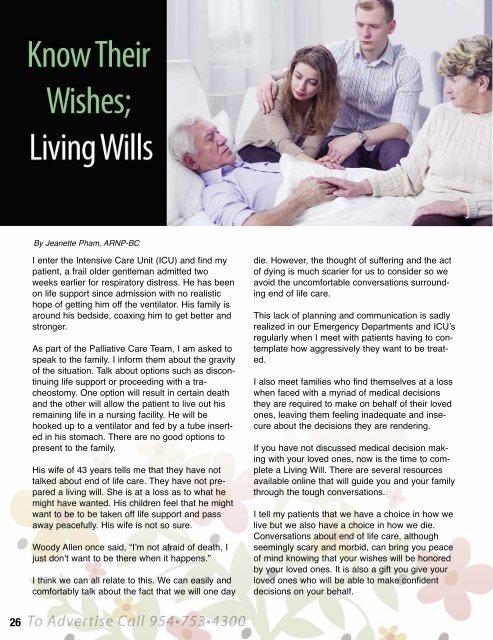Create successful ePaper yourself
Turn your PDF publications into a flip-book with our unique Google optimized e-Paper software.
By Jeanette Pham, ARNP-BC<br />
I enter the Intensive Care Unit (ICU) and find my<br />
patient, a frail older gentleman admitted two<br />
weeks earlier for respiratory distress. He has been<br />
on life support since admission with no realistic<br />
hope of getting him off the ventilator. His family is<br />
around his bedside, coaxing him to get better and<br />
stronger.<br />
As part of the Palliative Care Team, I am asked to<br />
speak to the family. I inform them about the gravity<br />
of the situation. Talk about options such as discontinuing<br />
life support or proceeding with a tracheostomy.<br />
One option will result in certain death<br />
and the other will allow the patient to live out his<br />
remaining life in a nursing facility. He will be<br />
hooked up to a ventilator and fed by a tube inserted<br />
in his stomach. There are no good options to<br />
present to the family.<br />
His wife of 43 years tells me that they have not<br />
talked about end of life care. They have not prepared<br />
a living will. She is at a loss as to what he<br />
might have wanted. His children feel that he might<br />
want to be to be taken off life support and pass<br />
away peacefully. His wife is not so sure.<br />
Woody Allen once said, “I’m not afraid of death, I<br />
just don’t want to be there when it happens.”<br />
I think we can all relate to this. We can easily and<br />
comfortably talk about the fact that we will one day<br />
die. However, the thought of suffering and the act<br />
of dying is much scarier for us to consider so we<br />
avoid the uncomfortable conversations surrounding<br />
end of life care.<br />
This lack of planning and communication is sadly<br />
realized in our Emergency Departments and ICU’s<br />
regularly when I meet with patients having to contemplate<br />
how aggressively they want to be treated.<br />
I also meet families who find themselves at a loss<br />
when faced with a myriad of medical decisions<br />
they are required to make on behalf of their loved<br />
ones, leaving them feeling inadequate and insecure<br />
about the decisions they are rendering.<br />
If you have not discussed medical decision making<br />
with your loved ones, now is the time to complete<br />
a Living Will. There are several resources<br />
available online that will guide you and your family<br />
through the tough conversations.<br />
I tell my patients that we have a choice in how we<br />
live but we also have a choice in how we die.<br />
Conversations about end of life care, although<br />
seemingly scary and morbid, can bring you peace<br />
of mind knowing that your wishes will be honored<br />
by your loved ones. It is also a gift you give your<br />
loved ones who will be able to make confident<br />
decisions on your behalf.<br />
26

















